Did we say “CarGenerator”? As in automobile + power-producing device? Well yes, we did!
If you love boondocking off the grid (like we do), you may have installed a substantial solar and battery setup (like we did) to provide virtually silent power from the sun.
But trees, clouds and night happen! That’s why so many people (ourselves included) carry a backup — a traditional gas generator (or a built-in gas or diesel generator).
Now imagine boondocking without that backup… or the need to carry fuel for it… without experiencing battery anxiety.
Suppose there was some kind of device on the market that could get power from your car to generate power for your RV (you probably see where we’re going with this).
Well, today we’re highlighting just such a device: the CarGenerator. And we’ve had first-hand experience to tell you that it can be a game-changer for many RVers.
Today we’re taking an in-depth look at this innovative device, which is so useful as a backup power source for RVs, that it’s also used as a unique source of emergency power for sticks & bricks houses.
- 1) What Is the CarGenerator?
- 2) Why Would I Want a CarGenerator?
- 3) Is a CarGenerator Super Heavy and Bulky?
- 4) How Do I Know Which Model of CarGenerator I Need?
- 5) Isn’t It Bad to Idle a Vehicle for a Long Time?
- 6) Why Not Just Buy a Gas Generator?
- 7) Isn’t a CarGenerator Just an Inverter?
- 8) What Do The RVgeeks Think of the CarGenerator?
- 9) Free RVing Tips, Tricks, Reviews, Giveaways & More
What Is the CarGenerator?
The CarGenerator is a unique product that offers backup power for an RV or a home.
Essentially, it’s a pure sine wave inverter encased in a waterproof/weatherproof housing, that connects to the battery terminals on your truck or car battery. You then plug your RV into it, anywhere you happen to be. It’s almost like having your own private portable power pedestal.
The system uses the alternator on your car, sport utility, or pickup truck to supply 12V DC power, which is then inverted to 120V AC power. That power is then sent to your RV via your rig’s power cord. It can then charge up your house battery, and run appliances and devices, just like shore power or a generator.
You can plug your RV into the CarGenerator and pull as much power as it’s rated to supply. There are different models available, and it’s important to consider the capacity of the alternator that’s powering it. More on that below.
We have a 1,000 watt model (that’s continuous, with a 2,000-watt surge capacity), which we used during our month traveling in a Black Series HQ19 off-road camper (look for an upcoming post about our experience on this awesome rig)! The HQ19 is equipped with 30-amp power, so we used a dog-bone adapter to connect the shore power cord to the CarGenerator.
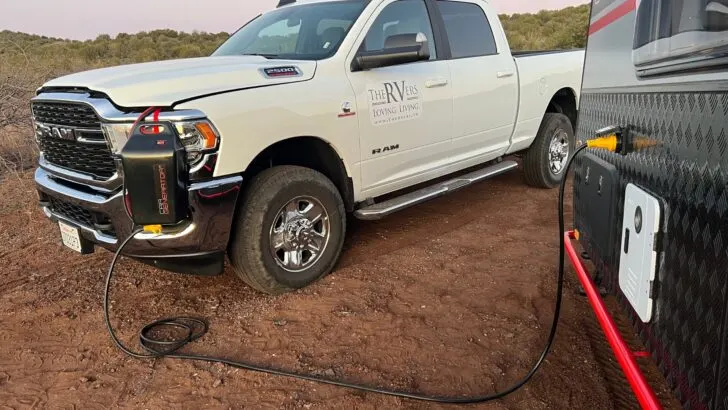
Here’s the CarGenerator on the front of our truck with our camper’s shore power cord plugged into it — powering our RV and recharging the house batteries. It’s like having your own portable power pedestal… anywhere!
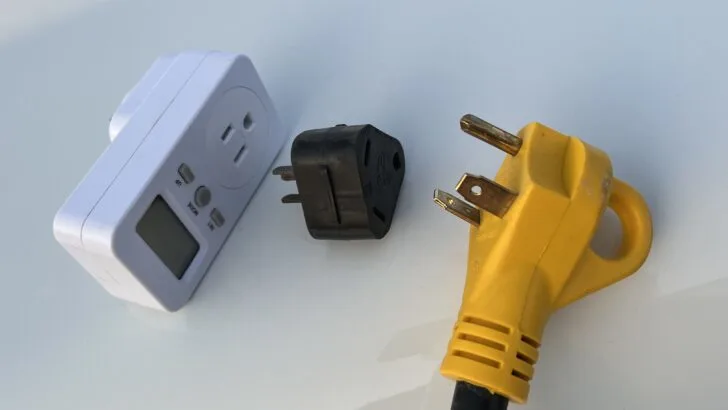
We plugged the 30-amp shore power cord from our Black Series camper into the CarGenerator using a small 20-to-30-amp puck adapter. We also used a voltmeter (included with the CarGenerator) in line to monitor power draw.
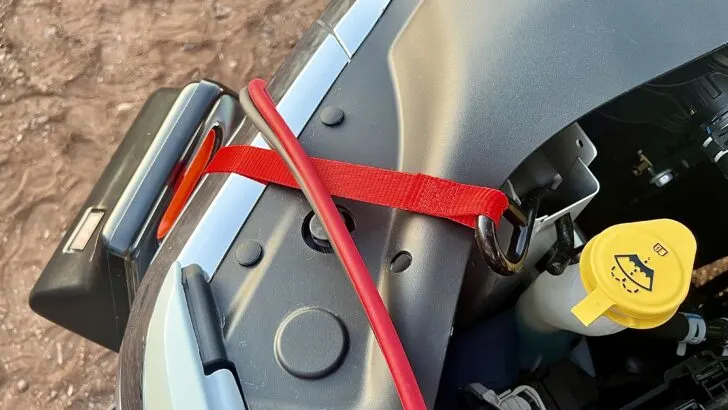
The CarGenerator hangs on the front of a car, truck, or sport utility using the high-quality hook and adjustable strap that come built onto the unit. Then the hood is left closed, but not latched, while it’s in use. The CarGenerator will fit on virtually any vehicle, and the high-quality weatherproof plastic case has a soft backing that won’t mar the vehicle’s finish.
Why Would I Want a CarGenerator?
The need for a CarGenerator is very much like the need for a traditional generator — to provide power. Whether you have a big solar and battery system or not, there are times when a source of backup power is needed.
We’ve always had a built-in diesel generator on our own RV. But when our time on the Black Series was drawing near, we knew that even with its decent-size solar and battery bank, a few cloudy days or a stay in a forest could leave us powerless. Thinking about that initially caused us some battery anxiety, since we don’t have a portable gasoline backup generator just sitting around.
Having a CarGenerator on board with us completely eliminated that stress, and saved our bacon during a couple of periods of heavy overcast.
It can also be used to power appliances in your sticks & bricks home in the event of a power outage. That includes the ability to run a household furnace to keep from freezing to death! And it can keep a refrigerator running so your food won’t spoil.
This type of situation is exactly what the CarGenerator was designed to address. The inventor of the CarGenerator, Jonathan Schloo, came up with the idea when his family’s home lost power for 3 1/2 days during a winter storm.
Jonathan bought an inverter and hooked it up to his Toyota Highlander. He was able to power his home’s furnace, lights, and fridge.
But using a simple inverter presented some issues that ultimately led to the design of the CarGenerator.
If your car starts and there’s fuel in the tank, one of these units will provide you with power when you need it, without the need for a gasoline generator.
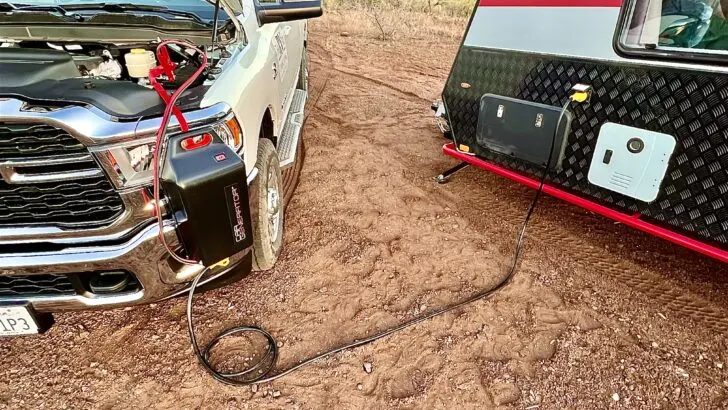
Our CarGenerator saved our bacon during extended overcast weather. Simply hang it on the front of the car or truck, attached the heavy-duty alligator clips to the battery, and plug in the RV’s power cord. The engine provides power to the RV like a portable power pedestal in the boondocks. Goodbye battery anxiety!
Despite the fact that Jonathan designed the CarGenerator for home use, it quickly became popular with RVers, too.
We all know how important power is to RVers, especially those of us who love to boondock. We need to be able to power things like refrigerators, lights, water pumps, smartphones, tablets, and computers. And of course, keep our rig’s house batteries charged.
For those of us whose rigs already have generators on board, a CarGenerator might not be a reasonable purchase as long as our built-in unit is in good running condition.
But many RVs don’t have a generator at all (like the camper we spent a month on). Additional power means either investing in a solar and battery system that’s capable of supporting the RVer’s power requirements, or carrying a portable generator, plus fuel for that generator.
Or really — BOTH of the above. That’s because solar & battery banks provide the quiet power we love for boondocking, but can’t help us when conditions don’t provide enough sunlight.
For these reasons, we’ve written many posts on topics related to things like quiet generators for RVs and solar generators for RVs. We’ve also created numerous posts and videos about the regular maintenance and repair generators require to continue working properly.
But even if you have a working built-in or portable generator, there are places where using one isn’t even an option, as some camping locations prohibit or severely limit their use.
Is a CarGenerator Super Heavy and Bulky?
At only 11 pounds, the All Weather 1,000/2,000 watt version of the CarGenerator (the most popular model, and the one we used and loved on our trip) is a compact, lightweight, quiet, and maintenance-free backup power source for any home, including an RV.
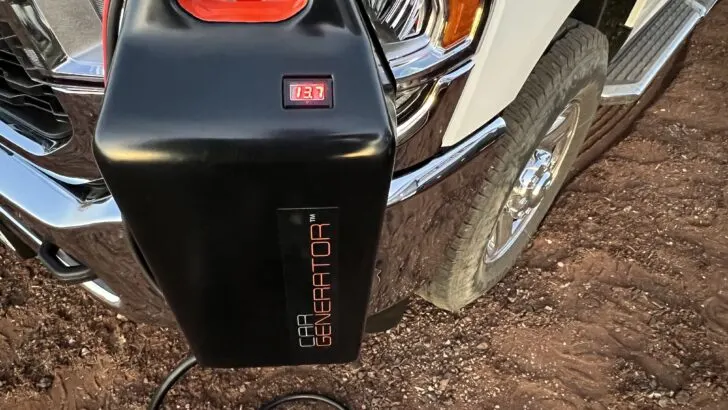
Our All Weather 1,000/2,000 watt CarGenerator weighs only 11 pounds and is super simple to use (and a lifesaver)!
It provides 1,000 watts continuous, and 2,000 watts surge of pure sine wave AC power. (That’s the good quality power that treats your electronics right!)
How Do I Know Which Model of CarGenerator I Need?
For most RVers, 1,000 watts continuous with a surge of 2,000 watts should be sufficient to power most small appliances or recharge the rig’s house batteries. This is roughly the amount of power you’d expect from a small portable gas generator. (For more on this comparison, see our post “What Is an Inverter Generator?“)
Having said that, you won’t want to run multiple power-hungry appliances all at once, just as you wouldn’t with a small portable gasoline generator.
You can also get a 1,500 watt (running)/3,000 watt (surge) model or even units that offer 2,000/4,000 watts or 3,000/6,000 watts.
If you decide later that you’d prefer a larger unit, CarGenerator offers a really clever program. You have two years to upgrade to a larger model, paying only the difference in cost. That should help make the choice easier if you’re not sure which one you want.
One of the most important factors to consider is the capacity of your vehicle’s alternator.
Start by looking at your alternator’s rated amp capacity (you may need to look in your owner’s manual, or check with your manufacturer). Then reduce that number by half to account for the lower output of the alternator at idle. Then multiply that number by 12 (volts). You can expect your alternator to safely provide this number of watts through the CarGenerator without draining your battery.
For example — a pickup truck with a 170-amp alternator: 170 ÷ 2 = 85 x 12 = 1,020 watts. That’s enough for us to use our All Weather 1,000/2,000 CarGenerator to provide power to our rig without draining the truck’s battery.
Because of the higher power demand of the larger models (2,000 watts continuous and above), they require an additional quick connect kit (a separate item at additional cost) that installs permanently to your vehicle’s battery to enable the CarGenerator to connect to power safely.
Using the 1,000-watt CarGenerator we could simply connect to our truck’s battery terminals using its heavy-duty alligator clips. We like the simplicity and lower cost of the 1,000 watt model and found it met our power needs really well. This probably accounts for why it’s their most popular model!
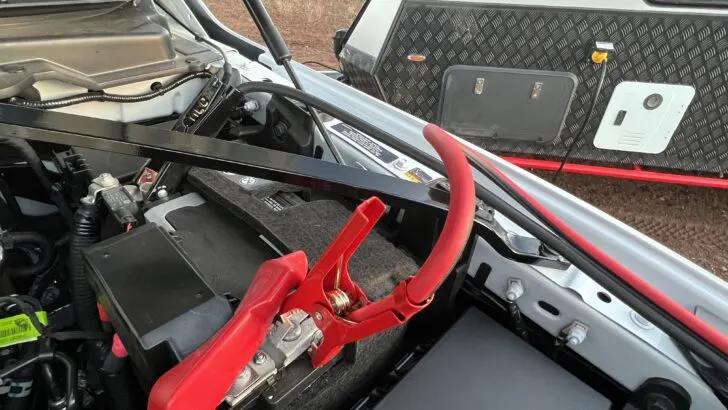
Here you can see the heavy-duty alligator clips from our 1,000 watt CarGenerator attached directly to our truck’s battery terminals. No installation is needed, and it couldn’t be any simpler to use.
Isn’t It Bad to Idle a Vehicle for a Long Time?
That was true many years ago but is no longer the case. Today’s engines have computers that keep them running properly at any speed, including at idle. A modern vehicle is safely capable of long periods of engine idling.
So, as long as you don’t try to use it on your ’55 Chevy Bel Air, the CarGenerator works on any gas, diesel, hybrid, pure electric (EV) vehicles, and idling those vehicles won’t cause any issue.
Why Not Just Buy a Gas Generator?
Besides the fact that there are limits to where and when you can use a portable gas generator, we found lots of advantages of the CarGenerator.
Lightweight and Simple to Use
The CarGenerator is lightweight. The All Weather 1,000/2,000 watt model, which is the one we have, weighs only 11 pounds and takes all of a minute or two to connect.
No Need to Carry Extra Fuel
Having a portable gas generator means also carrying around a separate supply of fuel and having a safe place to store it.
With a CarGenerator, if you own a car or truck, you already have most of what you need to generate power: a motor and a fuel tank!
Efficient
Our 1,000/2,000 watt All Weather unit can power the necessities in a sticks and bricks house. This means that it certainly has the capacity to provide power for an RV, which we experienced first-hand during our time on the Black Series camper.
When boondocking off the grid, RVers can use the CarGenerator to fully charge their house battery bank, and then run electronics and appliances off the batteries as usual. When the rig’s house batteries start running low, simply use the CarGenerator to recharge them again as needed.
Fewer Emissions
Using a CarGenerator is a cleaner way to produce power. That’s because gas generators have very little (if any) emission controls. Using a car or truck to provide power instead of a portable generator means far more effective emission controls are in place, producing less pollution.
Reliable
If your vehicle starts, you can use the CarGenerator. And since modern vehicles are so reliable, a no-start situation on your car or truck is less likely than with a portable gas generator.
Runs Longer
On average, most vehicles can get 50-70 hours of runtime on a tank of fuel. That’s a really long run time compared with a small generator with a far smaller tank that needs to be refilled every 4-6 hours.
Works with Electric and Hybrid Vehicles
The CarGenerator not only works with gas and diesel engines but also with hybrid and fully electric (EV) cars.
If you have a fully electric vehicle, then you’ll use no gas at all to run a CarGenerator.
Maintenance Free
A CarGenerator requires no oil changes or any of the other maintenance attention that small engines require.
Quieter
Have you heard the sound of generators running in a campground? Most modern vehicles with their engine idling are a lot quieter than any portable generator.
Isn’t a CarGenerator Just an Inverter?
No! Here’s why…
CarGenerator starts with a commercial-grade pure sine wave inverter and adds custom-manufactured heavy-duty copper cables designed to withstand the heat from your vehicle’s engine.
The inverter is enclosed in a weatherproof housing with a rubberized backing with an adjustable strap and hook for hanging on your vehicle.
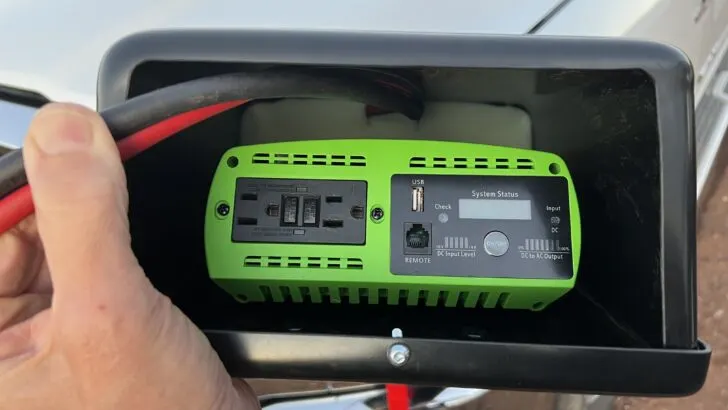
This commercial-grade pure sine wave inverter is enclosed in a weatherproof housing, allowing the CarGenerator to be safely used in any weather.
There’s also a power meter included, allowing you to monitor how much power you can safely generate from your vehicle.
CarGenerator offers units with a number of different capacities.
Their CarGenerator DRY model weighs only 9 pounds and is designed to power home essentials in a power outage for between 50 and 70 hours. As the name implies, the DRY model isn’t waterproof, so not designed for inclement weather.
The All Weather 1,000/2,000 watt model is fully weatherproof and weighs just 11 pounds. This is the one we have, and it did a great job for us!
What Do The RVgeeks Think of the CarGenerator?
When we recently spent a month onboard a Black Series HQ19 offroad travel trailer, even though it came equipped with a substantial battery bank and solar panel system, we did have some concern about not having a generator. We’ve always had one (built-in on our Class A motorhome), and we know that clouds, trees, and darkness (i.e. shorter winter days) can lead to a lack of adequate power when you’re depending exclusively on solar.
Having the CarGenerator with us completely eliminated that stress and filled in beautifully when the sun didn’t cooperate. It’s small & light, making it easy to store and bring along. And since it just connects to the vehicle you already have with you, it makes using it super simple. And there’s no additional fuel to purchase or carry around.
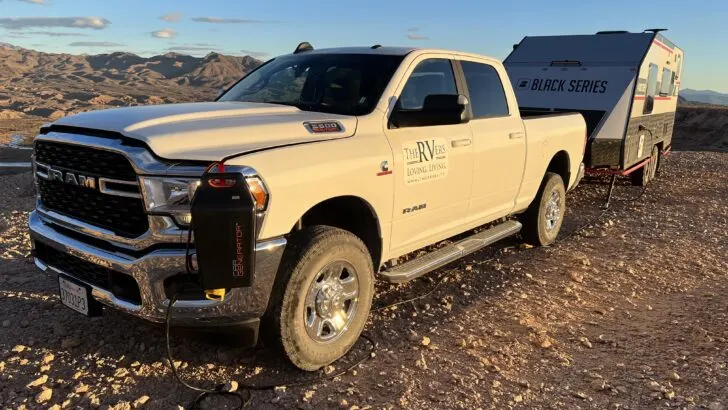
Here we are camping with the CarGenerator on the front of our truck, with our RV’s power cord plugged into it.
When a couple of days of clouds reduced the solar output we were getting, we were able to simply connect the CarGenerator to the truck’s battery, connect the trailer’s power cord to the outlet on the CarGenerator, and then idle the truck.
The 1,000W unit was plenty to supply power to the onboard charger (recharging the camper’s battery bank) and to our laptops so they could recharge without draining power from the battery through the inverter. Once the batteries were full, we could run off them, or continue using the CarGenerator to power other appliances. Think of it as a small, portable shore power pedestal.
Of course, we don’t want to idle the car or truck longer than needed. But it was so great to know we had that power available to us when the sun didn’t cooperate (like hiding behind clouds, or setting at the end of the day!)
We love having the back-up ability to produce power and are happy to add CarGenerator to our list of favorite RV gear.
We like this new tech so much that we’ve arranged a special discount for RVgeeks blog readers. Use the link below to access a special landing page that will provide a $150 discount on the same All Weather 1,000/2,000 model we have… and even more on other models!
CarGenerator is a cool new product the size of a backpack that transforms your gas or diesel car or truck into a backup electric generator. Portable, lightweight, and rain/snow weatherproof... you...Show More
CarGenerator is a cool new product the size of a backpack that transforms your gas or diesel car or truck into a backup electric generator. Portable, lightweight, and rain/snow weatherproof... you can take it camping or RV’ing to watch TV, recharge your RV batteries (like you were plugged into grid power), and lots more.
Use the "Go To The Deal" button to claim the discount on your CarGenerator today!
Show LessFREE shipping to USA and Canada is included, too! There’s also a 100% satisfaction guarantee. If for any reason you don’t like this product, you can return it within 60 days for a full refund.
Here’s a 60-second demonstration of a CarGenerator at work powering an Airstream:
Free RVing Tips, Tricks, Reviews, Giveaways & More
Subscribe to our daily newsletter! We’ve been full-time RVers for 20 years (!) and share everything we’ve learned about RVing in our daily blog posts. Join our online community to receive a wealth of great RVing knowledge delivered right to your inbox.
Whether this is your first time on the road or you’re a seasoned full-timer, you’ll love the wide range of RVing topics we cover. Don’t miss a single article or any of our famous RV gear Giveaways — Subscribe today!



Kat
Sunday 3rd of March 2024
We have owned and used a CarGenerator for several years. We needed to call with questions several times and EVERY time we called the owner and inventor, Jonathan, picked up. Outstanding customer service!
TheRVgeeks
Sunday 3rd of March 2024
We've never heard a single bad word about CarGenerator's customer service. So happy to hear your experience was the same, Kat!
Sabine Kirstein
Tuesday 6th of June 2023
Interesting article, but one question: how is this better than just connecting the camper to the truck with the camper cord and idling the truck? I use that to keep my one 12v camper battery charged when boondocking and to keep the brake and signal lights on while driving.
TheRVgeeks
Tuesday 6th of June 2023
Hi Sabine. Good question. With just a single battery like you have, that's absolutely a good solution. But when you start having larger battery banks, or if you upgrade to lithium, that's no longer the best solution for two reasons: (1) the alternator typically has a limited output and, when combined with the typically narrow gauge wiring used to bring power back to the 7-pin connector, you get very low amperage charging, and (2) there's no charge controller inline with that configuration, so the battery is just getting hit with amperage until it's voltage comes up high enough to resist.
#1 is a problem as you get larger and larger battery banks in the trailer... that small current spread over multiple batteries means you get little-to-no charging.
#2 is a problem for lithium batteries because their charging voltages are different than flooded lead acid batteries. And because they don't resist charging the same way flooded lead acid batteries do... so they just keep taking a charge, whether they need it or not, which can cause problems.
Barbara Bailey
Tuesday 7th of March 2023
Question on the car generator. How long would it take to recharge your RV battery? My RV has just one battery. Do you disconnect the battery cables from the car and hook it into the car generator instead?
TheRVgeeks
Sunday 19th of March 2023
Hi Barbara... that would depend on how big your RV's charger is. The larger the charger, the faster the battery will recharge. For example... let's say your RV has a 50-amp charger built in and has a 200Ah battery. Assuming you properly maintain it and only ever discharge it (at MOST!) 50%, you would have to replace 100Ah of power back into the battery. 100Ah divided by 50-amps = 2 hours... though, due to inefficiencies in charging, it would take a bit longer.
Jonathan
Tuesday 7th of March 2023
@Barbara Bailey, typically a couple of hours will do the job. you dont need to disconnect or do anything with your RV batteries. Simply attach the CarGenerator to your tow vehicle, and plug it into the regular campground power cable that your RV Trailer has built in. CarGenerator provides pure clean 120v standard grid power, and the trailer then recharges your RV batteries perfectly just like the factory designed. You can see more helpful videos of CarGenerator in action here. https://www.cargenerator.com/pages/videos
Michael
Sunday 5th of March 2023
Like you guys, we are full-time RVers. When we boondock, we generate power with our 10kw diesel generator. There's no one around to complain about noise. When we go to Alaska, like we are doing this summer, when staying at provincial and state parks with no services, I am self-conscious about the noise and have gotten complaints from neighbors. I even thought about buying a small Honda generator to keep the noise down. As I avidly read this article, I thought, "This device could be the answer to my problems!"
For a homeowner that needs emergency power, this is a great solution. For me, I'm not so sure. My class A has a 3,000 watt inverter, and a 120 amp house battery charger. I could connect my shore power cord to this device, run the charger and top off my batteries without drawing 1000 watts from my big noisy 10,000 watt generator.
Here is my question: To charge my battery, I'll need to invert my auto's 12 volts to 120 volts. Then, to charge my house batteries, I'll need to feed it through my transfer switch, surge protector, and house charger. Based on a brief search, each device in the line is about 90% efficient. By the time the power makes it to the batteries, the ultimate efficiency will be about 70-80%.SO, a 1000 watt unit would supply about 750 watts to the battery
Since this is the case and both the auto and house battery system are both 12 volts, why can't I connect my alternator on my auto directly to the house battery bank and eliminate all of the inefficiencies? No house charger or anything else. I can still make 120 volts using my house inverter.
While just connecting jumper cables would do this, I could make up or buy connecting wire and high current plugs, like the higher power devices use.
Any thoughts?
TheRVgeeks
Sunday 5th of March 2023
Interesting question, Michael. Not sure we're 100% qualified to speak directly to this... but our thought is that alternators are pretty dumb (they mostly just dump amps in until the voltage rises high enough to "resist" the flow), so depending on your towed vehicle and the size/heavy-duty-ness (not a word, but you get the point) of its alternator, you could overly stress it and burn it out prematurely since your house battery bank will just keep sucking power out for a long time. So, at a minimum in that situation (hooking your car/truck's battery/alternator directly to your RV's house bank), we'd suggest getting a DC-to-DC converter to help ensure a proper charge cycle for the RV's batteries and to help control the flow of power (to prevent your alternator from burning out).
Though we'd think that you may be better off with either a smaller, portable generator (to reduce the noise from your 10kW onboard generator when all you need is to top up your batteries)... or solar and a larger battery bank (so you can last through the periods without hookups without having to run a generator at all).
Bill
Sunday 5th of March 2023
Sounds OK for occasional light use or during emergencies but would be concerned about accelerated wear on very expensive alternators running at or near capacity and possibly other electrical components on my vehicle. Also wonder what the fuel usage is per kilowatt hour compared to a standalone gas generator.
Extended idling also is considered extreme use with more frequent oil and filter changes advised. Would feel much more comfortable with a diesel idling for hours than a gasoline engine.
Bill
Friday 10th of March 2023
@Jonathan, All good information thanks
Jonathan
Monday 6th of March 2023
@Bill, idling a vehicle for one hour is equivalent to driving roughly 25 miles. So running your vehicle for a couple hours every few days if you need power is very minimal compared to the thousands of miles we drive with our vehicles. FORD provides the example of a contractor that drives 50 miles and idles six hours per day, for 100 days, thats 600 hours of idling. Ford provides guidance that amount of idling needs to provide more frequent oil changes to factor for the additional engine use thats all.
Jonathan
Monday 6th of March 2023
@Bill, fuel consumption idling your vehicle using CarGenerator, is comparable to about the same amount of fuel to operate a portable gas generator. To produce 1000 watts uses about 5 horsepower, and consumes about 1/3 gallon of gas per hour. You can see this with your own vehicle using a simple OBD vehicle scanner, see this video for an example with a CarGenerator. https://youtu.be/_g888eWJl5o
TheRVgeeks
Sunday 5th of March 2023
Hi Bill! That is EXACTLY what we love about this option — we want it for light use and emergencies. When towing a trailer with pretty decent solar & battery banks (which the Black Series has), we ONLY need occasional emergency back-up power. In a month on the road, we needed the CarGeneratoer two times, during periods of heavy overcast. We like this option better than carrying a larger, heavier and more expensive portable generator that also requires carrying a can of gasoline with us for it. If we were planning to use auxiliary power all the time as part of our routine (we know lots of people who fire up their genset to make coffee and breakfast every day, which we would never do), a traditional generator would likely be a better choice. But it was the cleanest choice for occasional use we've seen, and we loved the peace of mind it brought the two times we needed it!